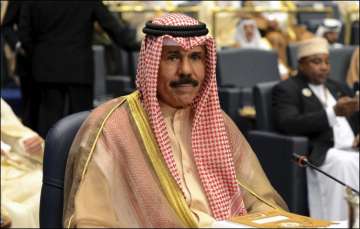Kuwait's ruling emir Sheikh Nawaf Al-Ahmad Al-Jaber Al-Sabah died at the age of 86, according to state-run media on Saturday. Sheikh Nawaf was admitted to the hospital for an unspecified illness last month after which the oil-rich country had been waiting for news on his health.
"With great sadness and sorrow, we mourn... the death of Sheikh Nawaf al-Ahmad Al-Sabah, Emir of the State of Kuwait," a statement aired on Kuwaiti state television said.
According to state media reports, the Kuwait emir travelled to the United States in 2021 for unspecified medical checkups. The health of Kuwaiti leaders remains a sensitive matter in the Middle Eastern nation bordering Iraq and Saudi Arabia, which has seen internal power struggles behind palace doors.
The state television interrupted regular programming on Saturday to cut to Quranic verses, which signals a possible death in the royal family, reported Reuters.
Who is Sheikh Nawaf?
Sheikh Nawaf was sworn in as Kuwait's emir after the death of his 91-year-old predecessor Sheikh Sabah Al Ahmad Al Sabah, who was known for his policies of diplomacy and peacemaking. Before this, Sheikh Nawaf served as Kuwait's interior and defence minister. His advancing age led to speculations that his tenure would be short.
Born in 1937, Sheikh Nawaf was the fifth son of former Kuwait ruler Sheikh Ahmad Al-Jaber Al-Sabah and started his political career at the age of 25 by serving as the governor of Hawalli province till 1978, before becoming the country's interior minister.
Sheikh Nawaf’s term as emir had been focused on domestic issues as it struggles through political disputes — including the overhaul of Kuwait’s welfare system — which prevented the sheikhdom from taking on debt. He issued a long-awaited amnesty decree to pardon and reduce the sentences of three dozen Kuwaitis to defuse a major government standoff.
He also issued another just before his illness, aiming to resolve that political impasse that also saw Kuwait hold three separate parliamentary elections under his rule. Kuwait is perceived as having the Gulf’s freest parliament that comparatively allows for dissent.
Meanwhile, the Gulf Cooperation Council states, including Qatar, Saudi Arabia and the United Arab Emirates, restored ties after years of a boycott of Doha, easing regional tensions and allowing Sheikh Nawaf to focus on issues at home.
Who will succeed Sheikh Nawaf?
After his death, Sheikh Meshal Al Ahmad Al Jaber, believed to be the world's oldest crown prince at 83, is in line to take over as the leader of the country. An official successor is yet to be announced.
Kuwait, which houses some 4.2 million people which is slightly smaller than the US state of New Jersey, has the world's sixth-largest known oil reserves. It has been a staunch US ally since the 1991 Gulf War expelled the occupying Iraqi forces of Saddam Hussein, hosting some 13,500 American troops in the country, as well as the forward headquarters of the US Army in the Middle East.
Kuwait has seen its fair share of political bickering between the parliament on several issues that have impacted investment and trade. The ruling power has tried to overcome political discord by responding to key opposition demands including granting amnesties to political dissidents, clamping down on perceived corruption and restructuring some key institutions.
(with inputs from agencies)
Latest World News
